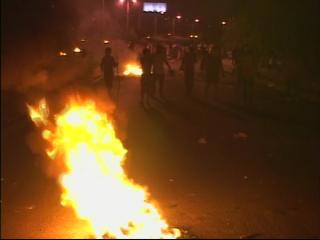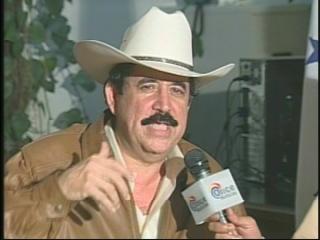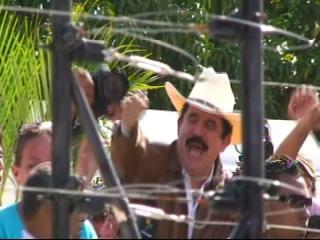Honduras’ interim leaders won’t allow visit
Delegation of foreign ministers planned to help settle post-coup dispute
 | Soldiers gather trash outside the Brazilian Embassy in Tegucigalpa, where ousted Honduras' President Manuel Zelaya has taken shelter since Monday when returned to the country. |
Esteban Felix / AP |
updated 3:55 p.m. ET Sept. 25, 2009
TEGUCIGALPA, Honduras - Honduras' coup-installed government plans to block the arrival of a commission of foreign ministers heading to the country this weekend to help resolve the country's political standoff, Costa Rican President Oscar Arias said Friday.
The Nobel Peace Prize laureate who moderated previous talks between Honduras' opposing factions said the government of interim President Roberto Micheletti has told the Organization of American States not to send the ministers because they will not be allowed into the country.
Arias made the announcement on the Costa Rican radio program Nuestra Voz.
Honduras puts off delegation's visit
Honduras' de facto rulers put off a visit by OAS foreign ministers, but they endorse one by a pair of mediators. The U.N. Security Council warns against any violation of the Brazilian Embassy.
Reporting from Mexico City and Tegucigalpa, Honduras -- Hopes for a breakthrough in Honduras' political crisis snagged Friday after the de facto government said it was not ready to receive a delegation of diplomats who were planning to help mediate.
Costa Rican President Oscar Arias, who has tried unsuccessfully to find common ground, said interim Honduran leaders told the Organization of American States not to send a delegation of foreign ministers.
In a statement issued late Thursday, Honduras' de facto rulers endorsed a proposed visit by Arias and Panama's vice president, Juan Carlos Varela, but said the OAS delegation would have to wait until later. Arias told Costa Rican radio Friday that he had no immediate plans to travel to Honduras, the Associated Press reported.
The OAS delegation was to have arrived Friday in Tegucigalpa, the Honduran capital. There was no immediate comment from the Washington-based hemispheric organization.
Neither side in the crisis has budged since ousted President Manuel Zelaya made a surprise return to Honduras on Monday and took shelter in the Brazilian Embassy. His return came nearly three months after the army seized him and flew him to Costa Rica in an ouster that drew wide condemnation.
The de facto rulers, led by interim President Roberto Micheletti, appear focused on the planned Nov. 29 presidential election, which they hope will be a key to ending the crisis and the international isolation that has come with it. For his part, Zelaya says the election will lack legitimacy unless he is first reinstated -- a stance the United States and others have echoed.
The U.S. has not recognized the Micheletti government and cut off some aid to Honduras.
Some analysts say pressure from outside and from the candidates who hope to be elected as Honduras' next president will push the two sides toward concessions.
Micheletti has taken a hard line, but "he won't be able to have time on his side," said Eduardo Bahr, a Honduran author and analyst. "I predict dialogue taking place in the short term."
Leo Valladares, a law professor, said that although Zelaya's unexpected appearance has sparked a fresh test of strength, both sides would end up yielding.
"Neither side wants to end up in a deadlock," he said.
The world has urged the two sides to talk and warned the interim leaders not to touch the Brazilian Embassy compound, where Zelaya has holed up with dozens of supporters amid scarce water and scant food. Many of those inside are sleeping on the floor and some have gotten ill, according to telephone interviews with members of the group.
Zelaya charged that the government is releasing toxic gases to make his backers sick. Police denied using gas.
On Friday, the United Nations Security Council denounced "acts of intimidation" against the embassy. In an emergency session, Brazilian Foreign Minister Celso Amorim complained that water and electricity had been cut to the compound, and that the interim government appeared to be considering storming it to seize Zelaya.
In a statement, the Security Council warned the de facto Honduran government to "cease harassing the Brazilian Embassy" and called on it to permit the flow of food, water, electricity and telephone services to the compound. It urged both sides to "remain calm," but did not address who should rule Honduras.
On Friday, the Honduran Foreign Ministry said charges that it was interfering with the embassy were "totally false." It pledged to respect international laws protecting embassies.
Tentative efforts in recent days to spark talks between Zelaya and the de facto rulers made little headway.
Zelaya said he met Wednesday night with an unidentified representative of the Micheletti government who offered to allow a third party to take over as president, a solution Zelaya said was unacceptable. Zelaya said the proposal would "legitimize that a coup d'etat could be used to negotiate the presidency."
On Thursday night, four of the candidates in the planned November presidential contest met separately with Micheletti and Zelaya to urge dialogue. Some Honduran politicians assert that a fair and clean election would help convince the world to recognize a new Honduran government.
Zelaya demands to be reinstated until his term ends in January.
Micheletti insists that Zelaya's removal was legal and says the ousted president must be tried on charges that include treason and abuse of authority. Arias proposed returning Zelaya to office with limited powers as well as an amnesty for both sides, but Micheletti rejected the idea.
ken.ellingwood@latimes.com
TEGUCIGALPA, Honduras – Costa Rican President Oscar Arias says Honduras' coup-installed government is blocking the arrival of foreign ministers sent to help resolve the country's political standoff. The Nobel Peace laureate has been moderating talks between Honduras' opposing factions following a June coup. He says the government of interim President Roberto Micheletti has told the Organization of American States not to send the ministers because they will not be allowed into the country. Arias told the Costa Rican radio program Nuestra Voz Friday that he had no further details. Micheletti government spokesman Rene Zepeda says Micheletti wants Arias to visit first so they can explain the situation. He says the ministers would be welcome next week. THIS IS A BREAKING NEWS UPDATE. Check back soon for further information. AP's earlier story is below. TEGUCIGALPA, Honduras (AP) — Ousted Honduran President Manuel Zelaya says initial talks with the government that booted him out of power have gone nowhere. But others see a willingness on both sides to push forward for a resolution to the country's protracted political crisis. An official with the administration of interim President Roberto Micheletti took "an extremely hard" stand when the two met late Wednesday night, Zelaya told TV Channel 36. The comment late Thursday was a direct reversal of Zelaya's earlier remarks to Radio Globo that the talks were "the beginning to find peaceful solutions." In contrast, Zelaya told Channel 36 that the government's positions are "totally outside of any possibility of agreement." The ousted president also reiterated his insistence that any agreement with the interim government include his reinstatement. The interim government did not immediately respond. Zelaya also met with the four leading candidates competing in the presidential election this fall and said that he plans to meet with business and social leaders this week. Zelaya has said that the Nov. 29 election won't be legitimate unless he is restored to office. The presidential candidates also met with Micheletti, who did not comment publicly. Elvin Santos, presidential candidate for the Liberal Party to which both Micheletti and Zelaya belong, said both sides are willing to start moving forward. "We have had an intense day and we were able to motivate them to go back to the negotiation table soon," Santos said. Zelaya had been demanding to talk with Micheletti since Monday when he sneaked back into the country and took shelter at the Brazilian Embassy. On Thursday, troops still surrounded the embassy, where an increasingly exhausted Zelaya, his family and about 70 supporters remained. But life outside the gates of the two-story compound was almost back to normal: After days of paralyzing curfews, most children returned to school, planes began landing at the airport, borders were open and downtown streets were again crammed with taxis, buses and vendors hawking newspapers, snacks and bubble gum. The government, however, declared a partial curfew for border areas and the northern industrial city of San Pedro Sula, the country's second-largest city, from late Thursday until Friday morning. Zelaya was kicked out of Honduras on June 28 after the Supreme Court endorsed charges of treason and abuse of authority against the leader for repeatedly ignoring court orders to drop plans for a referendum on whether the constitution should be rewritten. Micheletti has pledged to arrest Zelaya if he leaves the embassy. International leaders, including Brazilian President Luiz Inacio Lula da Silva and U.S. President Barack Obama, have called for Zelaya's reinstatement ever since he was ousted, and his surprise arrival in Honduras has prompted new calls for Micheletti to step down. The U.N. Security Council scheduled consultations for Friday on a letter from Brazil seeking an emergency meeting on Honduras. Rene Zepeda, the interim government's information minister, said Honduras has no intention of breaking ties with Brazil so it can go after Zelaya inside the compound. But he added: "Brazil should make Zelaya be quiet and provide the conditions so that he can dialogue with our government instead of unleashing violence in Honduras." About 3,000 Micheletti supporters marched toward the Brazilian Embassy and stopped in front of soldiers guarding the compound Thursday. Pro-Zelaya protesters held marches in working-class neighborhoods. Micheletti has said the conflict will be resolved when Hondurans elect their next leader Nov. 29, although the U.S. and other countries have said they may not recognize the vote if Zelaya is not reinstated. Former U.S. President Jimmy Carter, whose nonprofit center in Atlanta is dedicated to resolving conflicts, has been in touch with the Honduran government to express concern about the current situation, Carter Center spokeswoman Deanna Congileo told The Associated Press in an e-mail. Micheletti invited the Nobel Peace laureate to mediate new talks but Congileo said Carter is simply supporting efforts made by the Organization of American States and Costa Rican President Oscar Arias — another Nobel Peace laureate who moderated previous U.S.-backed talks.
Those negotiations broke down after Micheletti's government refused to
accept a plan that would allow Zelaya to return to the presidency with
limited powers and prohibit him from attempting to revise the
constitution. Zelaya's term ends in January.

 Play Video
Play Video 
 Play Video
Play Video  Play Video
Play Video 
No comments:
Post a Comment